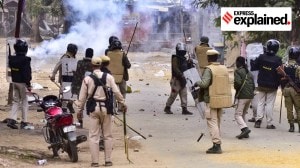Keeping the faith
Bangladesh's violent battle for secularism runs along old faultlines
Bangladesh8217;s violent battle for secularism runs along old faultlines
The collapse of Rana Plaza had seen a temporary truce between Islamist and secular forces in Bangladesh,as the country came to terms with a mounting death toll. Now the battle has resumed with renewed ferocity. On Sunday,Hefazat-e-Islami,a newly formed Islamist group,organised a march on Dhaka,reiterating the demand for a strong anti-blasphemy law. On Monday,violence spread and at least 37 were killed as the police pushed back on the agitators. This latest chapter of violence is part of the battle for the political soul of Bangladesh,triggered by the Shahbagh protests in February,with Prime Minister Sheikh Hasinas government struggling to maintain its secular authority against the onslaught of fundamentalist groups. But even this battle runs along older faultlines
Secularism had been one of the four founding principles of the Bangladeshi constitution adopted in 1972. Successive military regimes chipped away at these principles through a gradual Islamisation of the constitution,and by recognising religion-based politics. It was not until 2011,after Sheikh Hasina came to power,that the four founding principles were restored to the constitution. The 2011 amendment,which continued to recognise religion-based politics and Islam as the state religion,left both sides of the political divide dissatisfied. Then came Bangladeshs Shahbagh moment,which crystallised secular and Islamist positions in the country. The protesters had demanded death for those guilty of war crimes in the Liberation War of 1971,which includes several members of the hardline Jamaat-e-Islami. In retaliation,Islamist groups,backed by the Jamaat and the countrys main opposition,the Bangladesh National Party,asked for an anti-blasphemy law that would mean death for the Shahbagh bloggers,on the grounds that they had insulted the Prophet. Against all odds,Sheikh Hasina has vowed to maintain secularism as state policy.
For India,Bangladeshs valiant fight to preserve a secular space should be heartening. It must support progressive forces in the country,first by honouring its commitments to the Bangladesh government. It could begin by passing the Constitutional amendment required to implement the Indo-Bangladesh boundary agreement. But even this important issue has been surrendered to parliamentary spectacle. When External Affairs Minister Salman Khurshid tried to move the bill in Rajya Sabha on Tuesday,AGP members lunged for the papers he held. If India remains engrossed in political bickering,it could lose the chance to lend vital support in Bangladeshs battle for secularism.
- 01
- 02
- 03
- 04
- 05































